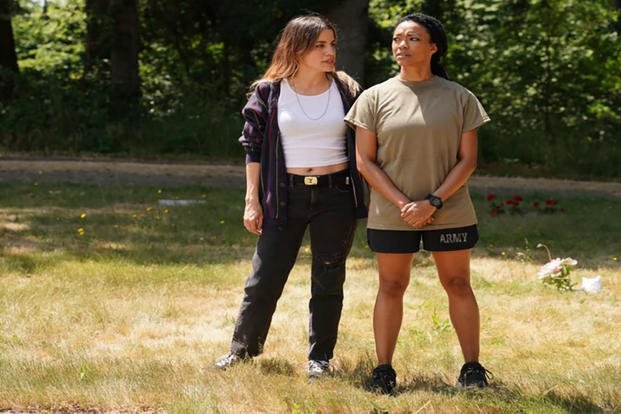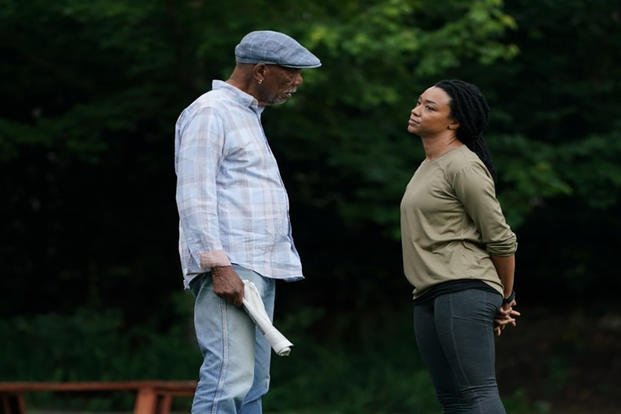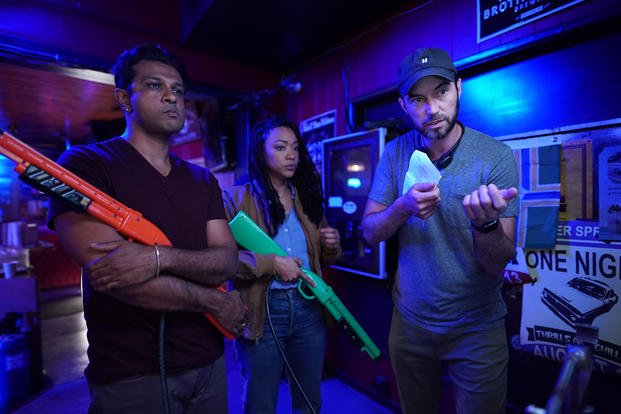A movie about growing from traumatic experiences, “My Dead Friend Zoe” was met with glowing reviews when it debuted in theaters in February. The film earned numerous awards at film festivals, including South by Southwest (SXSW) in Austin, Texas; Woodstock in New York; and Mill Valley in California.
“My Dead Friend Zoe” — now available on several streaming services, including Apple TV, Amazon Prime and YouTube — is inspired by the experiences of director and co-writer Kyle Hausmann-Stokes, an Army veteran who deployed to Iraq and received the Bronze Star Medal for his service.
“It was pulled from my real life, my flavor of PTSD from combat when I got back,” Hausmann-Stokes said.
Read Next: 4 Questions for ‘Warfare’ Filmmakers Alex Garland and Ray Mendoza
Hausmann-Stokes and actor Sonequa Martin-Green, whose character struggles with PTSD and family issues and is continually visited by the title character in “My Dead Friend Zoe,” sat down with Military.com for exclusive interviews before the film premiered in theaters.
Their responses have been edited for clarity. You can check out the full interviews at the YouTube link at the bottom of this article.
Kyle Hausmann-Stokes Interview
Military.com: What have been your takeaways from audience members who have seen your film at SXSW?
Kyle Hausmann-Stokes: The most meaningful responses I have received are about post-traumatic growth. It is an uplifting film that all of us veterans can relate to. It is not a sad story; there is levity with the gravity.
It’s all about talking about it. I didn’t want to talk about my stuff when I got back. I was pretty stubborn. I’m an infantry guy. My grandfather, a Vietnam veteran who is portrayed by Ed Harris in the film, and a VA counselor, portrayed by Morgan Freeman in the film, shook some sense into me. Through those experiences, I learned to talk about it. That’s been the greatest response I’ve received, talking about it.
I had a Vietnam veteran come up to me at SXSW and say, ‘I don’t talk about it, but I saw your film and I think I’m gonna talk about it.’ I was [at] the Mill Valley Film Festival, and this huge Marine came down to talk. Sometimes I’m not quite sure how fellow grunts, especially Devil Dogs, are going to take the film. There is no direct combat in this film, so it is a different kind of war film. The Marine was in tears, and moments like that are the most meaningful.
Military.com: What was your inspiration for the character of Zoe?
Kyle Hausmann-Stokes: It was pulled from my real life, my flavor of PTSD from combat when I got back. It included survivor’s guilt. It was the notion of a memory of a person. This film is 93% autobiographical. No, I did not directly see my dead buddies; that would be schizophrenia. It felt like I did. You have these conversations in your head with people about what could have been different. I’ve always been a creative person and wanted to tell a military story that had some cool magical realism in it. I wanted to tell an entertaining story about friendship and family. It happened to be veterans. We veterans, there is so much more to us than the service aspect.
Military.com: What has helped you process some of your trauma from the war?
Kyle Hausmann-Stokes: Talking about it. That’s what this film is. I was stubborn and thickheaded. You just drive on. One of the things I hope veterans will take away from the film is that you are not strong by not talking about it. You’re not brave by not dealing with it. You’re brave because you do. You’re strong because you did.
I’ve talked about it in a lot of different contexts. I didn’t do it initially in group therapy or one on one. I had a couple of bad experiences. I think a lot of veterans have had bad experiences, but guess what? You’ve got to kick some tires. I finally found a good one.
Finding a veteran community is key, too. I’ve dedicated my career to telling veteran stories, whether it’s for the VA or [a] nonprofit; there are always veterans on set, either in front of or behind the camera. We have these conversations. That’s the healing.
Military.com: What was the percentage of veterans who acted in the film?
Kyle Hausmann-Stokes: Ninety percent, including this veteran, Morgan Freeman, who served in the Air Force. Very, very proud of that. We had veterans behind the camera as well, but not as many. Our sound technician is a Devil Dog. All of the background [actors] seen in Afghanistan are all real veterans. The woman who sings in the park scene is wearing her real Army uniform. I love her 1st Cavalry uniform because my grandfather was 1st Cav in Vietnam. Through Veterans in Media and Entertainment, we look to put more vets on set.
Sonequa Martin-Green Interview
Military.com: What were your choices and inspirations for your character?
Sonequa Martin-Green: Kyle, our director and writer, and AJ Bermudez, who helped with the script. This is an autobiographical story. It’s about Kyle’s life. He wanted to tell this story to honor the battle buddies he had lost and hopefully to save lives. I have been honored to stand with him and to bring his life to light.
I did the best I could do with that, because it was an entirely unfamiliar experience. I have not served, but I have family members who have and friends who have. There is so much about your world and about service in general that I did not know. It broke my heart to find out about it. I just have grown so much and learned so much.
This film is not just for veterans; it is for anybody struggling with these things. But it is also specifically a veteran’s story. It has been such a lesson in life for me.

Military.com: You mentioned that there were family and friends who are veterans. Did you speak with any of them in researching the role?
Sonequa Martin-Green: I had the benefit of having Kyle. Merit [Martin-Green’s character] is Kyle. He decided to have a Black woman tell his story. I wanted to make sure I had a singularity of focus. I hope that others will relate to it. This is so specifically his story.
I focused on him and listened to a lot of veterans in the film. Everybody in the group session scenes are veterans. They are actors who happen to be veterans. They were telling me their stories. I listened to them and anyone who would share. I opened my ears and my heart and surrendered to it.
Military.com: What challenges did you deal with in portraying the character?
Sonequa Martin-Green: Stepping into these particular shoes was very challenging. It was very painful. There were many times throughout the shooting when I would be hurting. I would say to myself, “Yes, but he actually went through this, so you’ll be all right. Just do your job.”
I would say that to myself a lot. I have my own grief. I have my own touchpoint into this story. I know what it’s like to have survivor’s remorse. I know what it’s like to carry guilt and shame, almost to the point of it personifying itself [and] seeking to take over your life. I have gone through that, and Jesus had to heal me from that.
A lot of that pain, I was intimately aware of. I did not use it, but it was there. I feel what was most challenging was wanting so desperately to do it justice. There were times when it would go a bit too far; I could be really hard on myself. To honor all the folks that have been lost and to honor everyone’s pain and to honor these veteran experiences, it was heavy at times. By the grace of God, I got through it.

Military.com: What was it like being on screen with Natalie Morales, Morgan Freeman, Ed Harris and Gloria Reuben?
Sonequa Martin-Green: First off, with Natalie [who played Zoe], she’s a big reason why this film is as great as it is. You really needed the comedy and the spoonful of sugar to get the medicine to go down. She is utterly captivating, and that balance of gravity and levity was so necessary to make this film click. She was a safe place and a home for me. I did my best to be the same for her.
I learned so much from Morgan, Ed and Gloria and [loved how] “heart forward” these artists are, how seasoned they are. It’s really mind-blowing and really gripped my heart. Imagine being right in their faces as they are bringing all of this life your way. I will never be the same again.
Military.com: What made you commit to doing “My Dead Friend Zoe”?
Sonequa Martin-Green: It was the mission that made me want to commit to it. It was something I would have chosen at that time. I had recently wrapped “Star Trek: Discovery.” I was a bit rung out. I was ready to be home with my children and my husband. Then here comes this opportunity. I wouldn’t have chosen to be a soldier, to run, to be in that kind of soul turmoil.
Military.com: Have you had any audience members or veterans share their responses to the film?
Sonequa Martin-Green: So many have talked about how they see themselves in Merit. In Zoe. They see themselves in other cast members. There are also people who have shared their experience with me, and they are not veterans. They have a connection to veterans, or a connection to suicide or are passionate about suicide prevention. We heard from someone today that had a connection to Alzheimer’s and had a harrowing experience taking care of his mother. He really related to that element of the story.
I know people who were touched by this film because they had someone who struggled with PTSD — veterans and non-veterans. So many people are coming to us and sharing how the film touched their hearts and how it stays with them. One approached Kyle at SXSW, and he was a Vietnam veteran. He said to Kyle, “I have never talked about it, but now that I have seen your film, I think I’m finally ready to talk about it.”

Military.com: What would you most want people to take away from this film?
Sonequa Martin-Green: To not let it [mental trauma and PTSD] grow and fester in the shadows of their heart. To confront it by talking about it in safe spaces.
In addition to that, I hope people learn what I learned, which is how to listen better as well. Speaking to Kyle and the other veterans involved in this film, a lot of them shared how people don’t necessarily listen. They might ask a question or overreach and ask a question, but then, when the question is being answered, they detach, disengage, dissociate or reach for their phone. We can’t tell these people to talk if we are not prepared to listen.
I am so sorry for all the times in the past when I passed by a veteran or was in conversation with a veteran, and all I said was, “Thank you for your service.” I didn’t ask any follow-up questions, but now I am so excited to go out and do that. I hope that other people do that, too.
If you or someone you know is a veteran experiencing a mental health emergency, help is available. Call the Veterans Crisis Line by dialing 988 and pressing 1. You can also text 838255 or chat at VeteransCrisisLine.net.
Related: ‘My Dead Friend Zoe’ Delivers an Eye-Opening Message for Military Veterans
Keep Up With the Best in Military Entertainment
Whether you’re looking for news and entertainment, thinking of joining the military or keeping up with military life and benefits, Military.com has you covered. Subscribe to the Military.com newsletter to have military news, updates and resources delivered straight to your inbox.
Story Continues
Read the full article here





